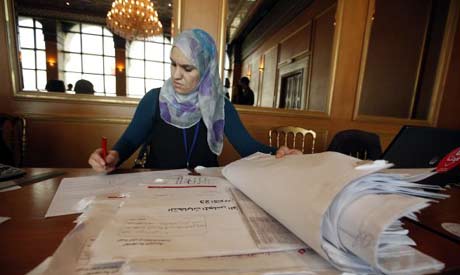
A worker in the independent commission organising the vote in Tunisia tabulates votes in Tunis, Monday (Photo: Reuters)
Tunisia’s first Election Day in the post-Bin Ali period passed without any incidents of poll-related violence and only a handful of reports of illicit campaigning, according to initial assessments by local and international election observers.
“It’s an extraordinary achievement; a milestone that is especially significant coming so shortly after emerging from decades of authoritarian rule,” read a preliminary polling assessment by the US-based National Democratic Institute (NDI), a copy of which was obtained by Ahram Online.
However, elections observers who spoke to Ahram Online said that both voters and local polling officials had faced a host of technical, political and logistical challenges throughout the course of the day.
On Sunday, millions of Tunisians voted for members of a Constituent Assembly mandated with drafting a new national constitution and forming the country’s first post-revolution government.
Several international organisations were invited by Tunisia’s interim government to monitor the voting process. In addition to the NDI, these included the US-based International Republican Institute and the Carter Center, along with a delegation from the European Union. Several Middle East-based rights groups were also invited to observe the polling.
According to the NDI’s preliminary assessment, voter registration represented the main test for Tunisia’s Independent Elections Authority (IEA), formed in the wake of the January revolution to oversee the country’s democratic transition. Although some three million citizens missed the voter-registration deadline, the IEA allowed unregistered voters to cast ballots at special polling centres.
These special polling centres were exceptionally crowded, noted NDI observers, while officials stationed therein were more likely to misunderstand voting procedures – especially in the country’s less developed south. Some would-be voters at these special centres simply gave up and left without casting ballots, according to NDI monitors.
Out of a total national population of ten million, 4.1 million Tunisians are currently registered to vote. In its report, the NDI recommended that voter registries be expanded to include unregistered citizens who cast ballots at special polling centres, along with expatriate Tunisians living and working abroad.
The NDI report went on to point out that the vote-counting process had been conducted at a slower-than-necessary pace. The lack of pre-printed tabulation sheets, which meant that poll workers had to manually draw up lists of all parties, for example, presented a major impediment to the counting process, the NDI noted.
“This created significant potential for human error both during the count itself and when compiling results at the national level, as each candidate list is assigned a different number depending on the district,” the report stated.
Many experts had initially feared that the large number of candidates – 11,000 – would inevitably lead to outbreaks of violence. To prevent poll-related violence, the IEA tasked both the military and security forces to deploy more than 40,0000 officers and soldiers throughout the country to secure a total of 7,213 polling stations.
By the end of the day, however, the NDI and other international observers recorded no incidents of violence at any polling stations or between the supporters of rival candidates.
Now that Sunday’s elections have been successfully concluded, the IEA is slated for dissolution. The NDI report, however, urges the incoming government to establish an independent elections commission on a permanent basis to build on the lessons learned in this first election.
Short link: